
"Ticket" leave .... the study times ashore to get your certificates |


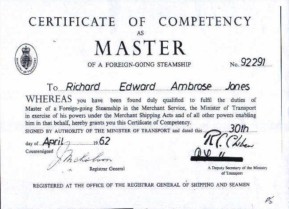


MY FINAL TRIP TO SEA |
WHY I LEFT THE SEA. " Swallowing the Anchor" as it was called at the time was a combination of factors, including:- 1) After 13 years at sea with the same line, it was becoming progressively rarer for us to visit new ports. 2) Valerie and I had by 1965 been married for over 4 years and whilst having Valerie with me for 3 voyages had been magnificent, I felt that if we were to have a family I should not want to be an absent father as I had heard of so many seagoing fathers having delinquent children. As I was 30 years old, starting a new career with a shore job would become progressively more difficult if I left it longer. As it was, the cut in salary would be large, but to do it before we had children was the best option. 3)Conditions for seafarers were changing, for the worse.We used to get 2 days for boiler cleaning every 3 months, but now the periods between drydocks were being extended and then we were only going in for a "wash and brush up". 4) I remember as Chief Officer of the ecstacy of having 400 gallons of Red lead paint delivered to us when according to my "Annual Inventory of Ship Stores" I was only allowed, and had only ordered 200 gallons. GREAT JOY - All the painting that we could do that trip ! ! Later it became very difficult to get even the basic essentials. 5) The attitude of L.O.F. management changed over the years from one of appreciation for the work of their employees .As Chief Officer at sea you would work say 84 hours per week, but if in port / tank cleaning / drydock etc. then this would rise to 110 - 120 hours or more per week . The attitude changed and the way I was treated during the " London Harmony" mutiny incident finally confirmed that the L.O.F. attitude had become unacceptable to me. 6) The largest of L.O.F. vessels at the time was 24,500 ton, and when we were in Hamble we could see across the water at Fawley four ESSO tankers each being 98,000 tons, and the technical press were saying that the Japanese were building 225,000 ton tankers. What would this do to our promotion prospects ? I was concerned about future prospects for command despite having been one of the first three L.O.F. apprentices, and having been promoted without delay once I had gained my certificates. Actual events: When the " LONDON PRIDE II" was built in 1982 she was a ship of 225,900 tons, and carried 18 times as much cargo as the "London Pride" on which I had sailed.In fact the NEW VESSEL carried 13,500 tons of BUNKERS and the OLD VESSEL only carried 16,000 tons of CARGO . See the size difference in the two photos below. |
QUALIFICATIONS I did not attend a pre-sea training school which was one of the main routes to becoming a Deck Officer apprentice. My preparation for getting my 2nd. Mate's Certificate was a Correspondence Course from King Edward VII College which I completed whilst an apprentice. These were the dates of passing my Certificates of Competency:- 2nd Officer foreign going 1956 1st Officer foreign going 1958 Master foreign going 1962 ........ and all were all gained at Liverpool after examination ( written and Oral ) by The Ministry of Transport after a period of formal school work of several months at the Liverpool College of Technology for the first two "tickets". The Tech. was located in Byrom street along with the Building School. When I sat for my Masters Certificate the school was opposite the Mersey tunnel entrance. When studying for 2nd and 1st Mates Certificates I stayed at PLIMSOL HOUSE in Gambier terrace. It was an end house of a road of large houses overlooking the Anglican Cathedral and had previously been owned by ship owners .Then the houses changed their use and for a time Plimsol House had been a private clinic. When studying for 2nd Mates I stayed there for 4 months in all as it was the first long leave that I had in 4 years. For the first 3 months we worked very hard on our studies because if we did not pass the examination we would have nothing to show for our time spent at seaand if we did pass we would get a small bonus from the company. The Plan was, Pass your written and orals ( in 3 months ) then take the signals at your leisure and take your time (about a month) and have fun at night, after the previous 3 months of 4 hours study each night. What we used to do after school , we went to Plimsol house for our tea, usually sausages and mash because we could not afford anything else. Then upstairs to my room in the old operating theatre which had a cracked glass roof. It had a large piece of glass missing which I blocked by using 2 rolled newspaper to stop the draught. It was cold in the room and I left my door open to get some heat that had found it's way up the stairs , all 60 steps of it, which meant that once I was up in my room I did not go downstairs unless I really had to.The cold was so intense in winter that I kept a towel between my hand and the paper on which I was doing my homework, and at night I kept my very thick "real" Duffle coat on the bed so as not to freeze as I slept. Some of the other ex- apprentices stayed at the Catholic mission which had better accommodation a better bar and Dances but it was too expensive for most of us. We did get the Dole,after 3 working days at school but the Dole Office clark was a little rat. He tried his best to make life difficult for us until E.G.G. Williams, a quiet giant from Anglesey, lost his temper and leant across the "people proof counter." He grabbed the clark by his lapels pulling him across the counter, with us shouting "Put Him Down EGG." After that we had no trouble in getting the pittance on which we relied. When up for Masters I was already married and living at 34 Mayville Road. It was again a very hard winter I remember the ice and snow stayed on the road for 6 weeks. After school and having returned home, Valerie was able to help me with my homework by doing the question and answer work with me. She got very involved to the degree of sitting up in her sleep at 01:00 and quoting CORRECTLY word for Word Rule 18 of "The Rule of the Road" |
EXAMINATIONS The examination was a ritual which had been developed and finely honed over the years to increase the tension on the candidate. The theory was that if he could pass the orals especially, then he would most probably make the right decision at sea when half asleep, with no one else to ask, and the right answer was needed in a hurry. The school used to ask that when you had done your orals that you returned to the school and tell them the questions which had been asked so that they could prime the next candidate. The day I went up for orals it HAD to be different because there was a new examiner - Captain Fletcher from London and we knew nothing about his favourite type of question. I heard that he had thrown all the first four candidates out in the morning. ! ! Then as I approached the examination room I met No. 5 who had also been thrown out. Well I thought " Here goes NOTHING, Captain Fletcher is out to make a name for himself and fail everyone on his first day" I was called in for the orals and the first view of the man was a shock. His face was a mask of shining very tight purple scar tissue which had caused one eye to be a strange shape. His hands were also scarred purple, and deformed.His first words to me while I was still in shock was a shouted instruction ........" Drop your Eyelids". What on earth did the man mean ? He barked the order again, and this time I was able to comply, but without knowing why he wanted me to close my eyes. . The reason for the order I later found out was to see if I used contact lenses. The examination went on for 45 minutes and at the end he declared that I had passed very well. The reason for Captain Fletcher's disfigurement was that he had been very badly burnt in the war. Captain Fletcher also examined me for 1st.Mates and Masters and on each occasion he was very interested in not only being certain that we knew the answer by rote, but also WHY. When he examined me for Masters he gave me an indepth examination into my understanding of the deviascope and compass adjusting. This subject had been of concern to me for the first 6 weeks at school as the theory did not mean a thing to me, it might as well have been in Ethiopian but the week before the exam we did practical work and I stopped, my jaw dropped. It all made sense at last, even if in real life it was never likely that I would need the skill as a professional Compass Ajuster would always be employed to do this technical job. Captain Fletcher said I had passed my Masters and I should consider going for Extra Masters, from him a real compliment, but the thought of another year at college with no pay,for a qualification that only brought £ 5 a month extra pay and the envy of shipping line superintendents was not an option to me. Within weeks afterwards I joined a ship that went to drydock and one of the jobs was the replacing of the monkey island decking.This meant that for a while the Magnetic compass binnacle had to be removed then replaced. On the day we were to sail the 2 compass adjusters at Skaramanga drydock were compass adjusting on other ships and not available, so our Captain said "You have just got your ticket, How about adjusting the compass "? We left the drydock and went out into Athens bay where we swung ship to do the compass adjusting and for the distant point I was able to use the sunlit Acropolis which is something Different from the normal landmarks used by compass adjusters. The adjustment went well and we were on our way in 1 hour 30 minutes.No problems resulted from the adustment and everything was normal until we were leaving the Persian Gulf and when we were off Ras Al Hadd the Gyro compass broke down. We then had to rely on the magnetic compss all the way to Australia,which we found with no difficulty, nor any unexpected magnetic variations It was a very pleasant and memorable experience to put the theory into practice with such a good result especially as very few people ever get the opportunity. |
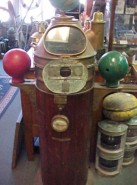
I saw that 18 old vessels would have required 18 Masters and 4 relief Masters
= 22 total compared with 2 Masters they had on the New Vessel ( 1 on 1 off ) so prospects for command were drying up quickly. The Gross pay for 22 Masters at 1952 rates is now paid to only 2 Masters only. I would have been promoted Master at 40 years of age as proved by when John Clark the next one after me on the list got his command but at 43 I would have been made redundant, when L.O.F. sold most of their ships. " I concede that in my time with L.O.F. I had been made rich in experience " =====0000000000000000000000000000000000000===== |
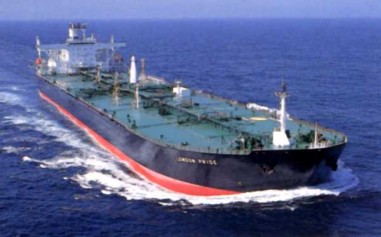
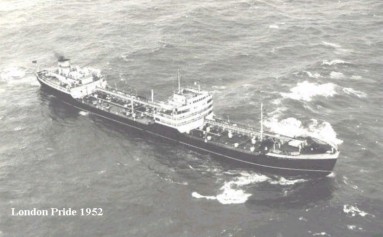
1952 London Pride |
1982 London Pride II |
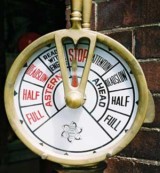
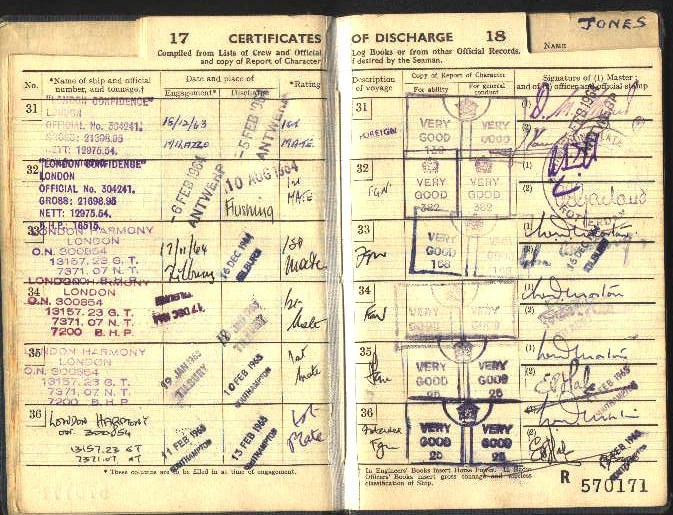
13th. February 1965 FINISHED WITH ENGINES...... |
Argentine Australia Bahrain Belgium Brazil Colombia Cuba Curacao (Netherland Antilles) Djibouti Doha Egypt Finland France Germany Gibraltar Greece Holland Hong Kong India |
Indonesia Iran Iraq Italy Japan Kuwait Lebanon Malaysia Malta Mozambique Portugal Russia Saudi Arabia Senegal Singapore South Africa Spain Trinidad and Tobago Uruguay USA Venezuela Yemen (Aden) |
Total of 41Countries, Colonies and Protectorates visited :-
Longest non stop sea passage: Willemstad (Curacao) Netherlands West Indies to Pulo Bukom off Singapore Distance 11,588 (nautical miles) Days at sea 42 Total distance on all vessels in my time at sea 714,886 miles |
Countries visited |
ACKNOWLEDGEMENTS I would like to record my appreciation to the following for their help C.Davison J. Ferrier G.Oliver G.Pilcher R Rushbrooke Mr. and Mrs Wallis And my grateful thanks to the many " Shipmates " of mine,( and a few Board of Trade
Acquaintances) who so generously shared their knowledge and experiences with
me. R.E.A.Jones. 2003 |